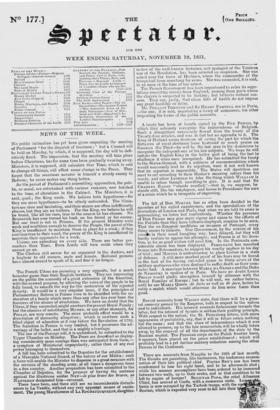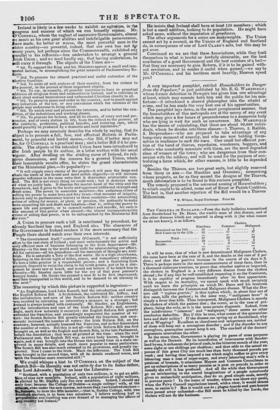There are accounts from Nauplia to the 20th of last
month. The Greeks are punishing, like barbarians, the barbarous assassir nation of their late political chief. PIETRO BEY'S son has been condemned to lose his right hand, and to be afterwards shot while his meaner accomplices have been ordered to be immured between two walls, up to their necks, and in that condition to be left to expire of hunger! SELICTAR PODA, the rebel Albanian Chief, has arrived at Corfu. with a numerous suite. Lo bania is now occupied by the Turkish troops, with the e Scutari, which is expected very soon to fall into their
Ireland is likely in a few weeks to exhibit. an agitation; in the progress and success of which we can honestly rejoice. Mr: 40'CoNNELL, whom the neglect of successive Governments, almost as much as his own great abilities and indefatigable perseverance, 'lave made, for better or worse, the most powerful man in the sister country—so powerful, indeed, that our own has not fqr ',many years, not perhaps since the Commonwealth, exhibited any parallel to his influence—has undertaken to arrange a general Irish Union ; and we need hardly say, that having undertaken, he will carry it through. The objects of the Union are- " 1st. To support the King and his Ministers against a small and inte- seated faction, in accomplishing the great measure of Parliamentary Re- Sprm.
2nd. To procure the utmost practical and useful extension of the tileetive franchise.
" 3rd. To unite all well-wishers of their country, from the richest to the poorest, in the pursuit of these important objects. " 4th. To use, incessantly, all possible exertions to bury in perpetual thlivion all religious feuds and animosities in Ireland, and to cultivate in *Jmir stead mutual benevolence and unbounded Christian charity to all. " 5th. To preserve peace and order in the country, and to guard against ray infraction of the law, or any convulsion which the enemies of the people may endeavour to bring about. 6th. To watch over and promote the interests, and to better the con- ilition, of the industrious and working classes. " 7th. To procure for Ireland, and all its classes, of every sect and per- suasion, and of every station in life, from the richest to the poorest, all the comforts, protection, political benefits, and fostering care, which c ould possibly be produced by a domestic and local legislature."
Perhaps we may concisely describe the whole by saying, that its object is to procure a full, free, and effectual Reform in Parlia- inent, by peaceful and lawful means,—the Bill, if better may not he, for O'CONNELL is a practical man ; and a better Bill if it be pos- sible. The objects of the intended Union have been introduced to Idle Irish people by its author, in a letter written with his usual vigour. After dwelling on the abiding curse of Ireland, its reli- Oous dissensions, and the reasons for a general Union, which their lamentable results offer, he states the grand characteristic Of the Ministerial plan,—its popularity- " It will cripple every enemy of the people—it will pare the fangs and chain the teeth of the brutal and most selfish oligarchy—it will increase popular influence in the same ratio that it diminishes aristocratic con- trol. The Bill is not every thing we could wish ; but it destroys much of what we justly hate. It disarms the master-hand of the whip and the tomahawk, and it gives to the lowly and oppressed additional strength and .f resh arms. The power to nominate members—the audacious crime of selling the power to make laws and levy taxes—that monster of iniquity, known only to parliamentary history in these countries—the astonishing
crime of selling for money, or place, or pension, the authority to make laws respecting life and death and taxation—that is, selling the power to
spare life and property, or to commit robbery and murder, for such is the amount of this power when abused—the almost incomprehensible crime of selling that power, is to be extinguished by the Ministerial Bill or ever."
A Union to procure such a bill is sanctioned by precedent, for IDIready Scotland has one, and England also. The character of the Government in Ireland renders it the more necessary that the People there should watch over their own interests.
" The Government itself," continues O'Connell, " is not sufficiently alive to the real state of Ireland ; and most unfortunately the active and only efficient man of business belonging to the Irish department—Mr. Stanley—is the man in the world. most unfit for administering our affairs. All his opinions—all his prejudices—all his materials of thought are Anti- Irish. He is naturally a Tory of the first water. He is a high churchman, believing in the divine right of tithes, cesses, and compulsory oblations. To him a tithe-proctor is a respectable person ; and a famishing Irish peasant, disposed to resist the claim to his tenth potato, put in by a cler- gynnin he never saw or heard, and would not believe if he heard him to eternity—Mr. Stanley cares little for the cry of that poor. peasant's hungry family. He thinks the peasant a man fit to be first imprisoned, and then transported in this world, and to be damned to all eternity in the next."
The reasoning by which this picture is supported is ingenious— "An Englishman, Lord John Russell, had the introduction and care of the English Reform Bill. A Seotehman, the celebrated Mr. Jeffrey, had the introduction and care of the Scotch Reform Bill : neither country was insulted by intrusting so interesting a measure to a stranger; but Ireland is always treated with contumely. Mr. Stanley, an Englishman, pot the introduction and care of the Irish Reform Bill ; and, accord- ugly, mark how naturally it occurred : the English Reform Bill greatly extended the franchise, and exceedingly augmented the number of vo- ters : the Scotch Reform Bill greatly extended the franchise, and enor- s imously increased the number of voters : the Irish Reform Bill, on the contrary, lessened, actually lessened the franchise, and in fact diminished the number of voters. But this is not all—the Irish Reform Bill was first brought on, as well as the English and Scotch Bills, in the late Parliament, before the dissolution ; they were all printed at the time : when the new Parliament met, the English. Bill was, as every body knows, brought in again, and it was brought into the House this second time in a state im- proved in many details, and much more popular in many particulars. The Scotch. Bill was also much enlarged in its provisions, and greatly im- proved. Now I come to the Irish. Mark the difference. The Irish Bill was brought in the second time, with all its details rendered worse, and 'with the franchise more restricted still !"
We could whisper a hint to O'CoNNEw. on the subject of the Scotch Bill—its liberality was not entirely due to its foster-father, the Lord Aavocate;'hitit let-us hear the Liberator- " Scotland, with a population of only two millions, is to get an addi- tion of nine new members. Ireland, with a population of eight millions, Di allotted by Mr. Stanley only five new members. Indeed, I should say only four; because the College of Dublin—a single college! with, at the utmost; even under the new system, not more than twohundred electors— tap Carsootb, to have the fifth member,—that is, Dublin College, with two klundred electors, is to have two members. I believe nothing half so preposterous and insulting was ever dreamt of in managing the affairs of .any country but Ireland.' lisinsists.that Ireland shall have at least 120 members ; which is but a small addition,. looking to its population. He might have asked more, without the imputation of greediness. The other arguments for a union are makeweights. The Union cannot act by a council, as the Unions of England and Scotland do, in consequence of one of Lord CLARE'S acts, but this may be got over. Convinced as we are that these Associations, while they limit themselves to what is lawful or lawfully obtainable, are the best auxiliaries of a good Government and the best resisters of a bad— that they are necessary to gain Reform, if it is to be gained with- out revolution, and to render it useful when gained,—we say to Mr. O'CONNELL and his brethren most heartily, Heaven speed you!



























